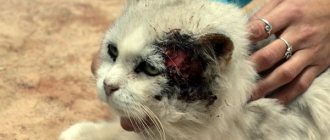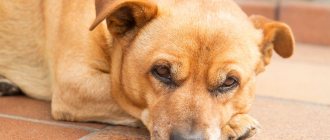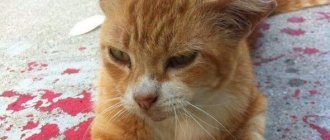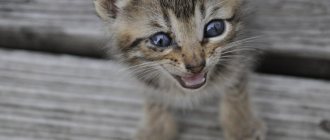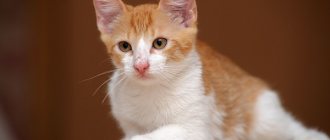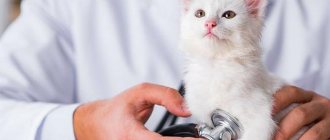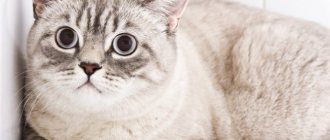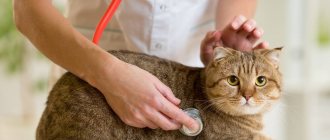Serious gastrointestinal diseases in cats arise due to insufficient quality nutrition, infectious diseases, oncology and inflammatory processes. Cats quickly lose weight, lose their appetite and become lethargic. If such signs appear, then this is a reason to take your pet to the veterinarian for a check. Prevention includes proper nutrition and daily oral hygiene.
Inflammation of the colon in a cat
Symptoms of colon inflammation in a cat
- Diarrhea.
- Problems with bowel movements.
- Mucus in the stool (sometimes bright red blood).
- Nausea (about 30% of cases).
- Sometimes - weight loss.
Treatment of colon inflammation in cats
First of all, contact your veterinarian. It will help identify and eliminate the cause of the inflammatory process.
Strictly follow the veterinarian's recommendations. In some cases, changing your diet is enough, but anti-inflammatory drugs may also be needed.
Diagnostics
Taking an anamnesis is important. The doctor needs detailed information about the age of the animal, when and with what the cat was vaccinated and dewormed. Information about the composition of the diet and the date of onset of the first pathological symptoms may be required. If a fellinologist has several animals, what is their health? Are all of them sick or just one?
The most characteristic signs of intestinal inflammation are blood or mucus in the feces, as well as diarrhea and vomiting over a significant period of time. When examining, pay attention to thinness, the intestines become thickened. Laboratory tests are not informative. As prescribed by the doctor, a biopsy, bacterial culture of feces, a test to detect protozoal infestation, and a test diet are performed.
Constipation in a cat
In most cases, constipation is easy to manage. However, there are serious cases that are difficult to treat.
Long-term constipation can be caused by intestinal obstruction, narrowing of the intestine from external problems, or neuromuscular problems in the colon.
Symptoms of constipation in a cat
- Difficulty with bowel movements.
- Dry, hard feces.
- Sometimes: depression, lethargy, nausea, loss of appetite, abdominal pain.
Treatment of constipation in a cat
- Consume more fluid.
- Sometimes, if the constipation is mild, putting your cat on a fiber-rich diet and providing constant access to water will help.
- Laxatives are sometimes used, but only a veterinarian can prescribe them.
- In severe cases, the veterinary clinic may remove feces using an enema or other means under general anesthesia.
- If constipation is chronic and cannot be treated, surgery may be performed to remove the affected part of the colon.
You should not self-medicate, as medications that once helped you or someone you know can be very dangerous for your cat!
Prevention
Gastrointestinal diseases are prevented through proper pet care. Your daily diet should consist of foods rich in healthy vitamins and minerals. Therefore, it is recommended to give high-quality food, for example, you can give Royal Canin brand products. Food should be at room temperature. The cat should have free access to water, as pets drink little but often. It is advised to take additional vitamins. In addition, it is advisable not to forget to clean the cat’s mouth so that bacteria do not accumulate in it.
Coronavirus enteritis in a cat
It is a contagious disease associated with a virus and transmitted through close contact. The virus is transmitted through contaminated objects and feces.
Symptoms of coronavirus enteritis in cats
In kittens: fever, diarrhea, vomiting. Duration: 2 – 5 weeks.
In adult cats, the disease may not manifest itself externally.
Remember that even if the cat recovers, it may still be a carrier of the virus. Infection can only be prevented by minimizing the cat's contact with feces.
Treatment of coronavirus enteritis in cats
There are no specific treatment methods. As a rule, supportive medications and, if necessary, fluid infusions are prescribed.
Inflammation of the stomach (gastritis) in a cat
The cause of gastritis can be the ingestion of an object that violates the integrity of the mucous membrane.
Symptoms of inflammation of the stomach (gastritis) in a cat
- Nausea, which can cause weakness, lethargy, weight loss, dehydration, and salt imbalance.
- If gastritis is prolonged, you may notice food debris (for example, grass), blood or foam in the vomit.
- Diarrhea is common.
The prognosis depends on the causes of gastritis and the success of the treatment.
How does the gastrointestinal tract of cats work?
Food enters the cat's stomach through the esophagus. Food is digested in the stomach. Cats have very acidic stomach juice. This is necessary to break down the meat and bones of the prey. The acidic environment of the stomach fights pathogenic microbes and parasites.
From the stomach, food enters the duodenum. Here the food mass is mixed with bile, which is produced by the liver, and fluid, which is produced by the pancreas. These fluids contain enzymes that break down proteins, carbohydrates and fats, and also neutralize stomach acid.
After this, the food mass passes through the small intestine. The walls of the small intestine absorb nutrients, vitamins and minerals. This way, everything necessary for the cats’ health gets into the bloodstream.
The food mass then enters the large intestine. The body absorbs remaining nutrients and excess fluid. After some time, undigested parts of food are eliminated from the body.
The gastrointestinal microflora helps cats break down food and protect themselves from harmful bacteria. The intestines of cats are inhabited by many beneficial bacteria, which ensure the health of the pets' gastrointestinal tract.
Structure of the gastrointestinal tract of cats
Bowel cancer in a cat
The disease is quite rare (approximately 1% of cancer cases in general). Most often, cancer affects the large intestine in an older cat. The causes of the disease have not yet been precisely determined, but there is a version that the alimentary form of lymphoma may be caused by the feline leukemia virus. Typically, intestinal tumors in cats are malignant and grow and spread quickly.
Symptoms of intestinal cancer in a cat
Symptoms depend on the location and size of the lesion, but often include:
- Nausea (sometimes mixed with blood)
- Diarrhea (also bloody) or difficulty defecating, constipation
- Weight loss
- Abdominal pain
- Bloating
- Abdominal infections associated with intestinal diseases
- Sometimes – manifestations of anemia (pale gums, etc.)
Diagnosis includes a medical history, physical examination, and biopsy of tissue samples.
The preferred treatment is surgical removal of the tumor.
The prognosis can be good or bad, depending on the type of tumor and whether it can be removed.
Major diseases
All diseases of the digestive tract are divided into infectious (colitis, coronavirus enteritis, gastritis) and non-infectious (constipation, cancer, intestinal obstruction, peptic ulcer, malabsorption syndrome). Let's take a closer look at each disease.
Colitis
Colitis is a disease characterized by inflammation of the large intestine. There are several reasons that lead to the development of the disease:
- Viral or bacterial inflammation.
- Parasitic infestations.
- Damage to the intestinal mucosa by a foreign body.
- Dietary disorder.
Clinically, colitis is manifested by local inflammation in the intestines (secretion of mucus and blood with feces, painful sensations) and intoxication syndrome (lethargy, refusal to eat and play, constant drowsiness).
Constipation
Constipation is a fairly common problem in cats. In this case, the pet rarely defecates; feces remain in the intestinal cavity for a long time and lead to intoxication.
Coronavirus enteritis
Coronavirus enteritis is an inflammation of the small intestine that occurs when exposed to a virus. The disease is infectious in nature and is transmitted by the fecal-oral route. A pet can become infected from sick cats that shed the virus in their feces. Kittens and older pets are more likely to get sick.
Gastritis
Gastritis is a disease characterized by inflammation of the gastric mucosa. The following reasons can lead to the development of gastritis:
- Poisoning (both chemicals and food).
- Dietary disorder (consumption of inappropriate foods).
- Hairball in the stomach.
- Taking certain medications.
- Allergic reaction.
Gastritis can occur in two forms: acute and chronic.
Bowel cancer
Colon cancer is uncommon in cats. It is a malignant tumor that is prone to unlimited growth and metastasis.
It is quite difficult to detect a tumor in the initial stage; most often it is an accidental discovery.
In the later stages, intestinal cancer is manifested by a significant decrease in body weight, lethargy, and apathy. Often, a cat is bothered by constipation and bleeding in the feces.
The prognosis in most cases is unfavorable, but depends on the detected stage and nature of the tumor.
Obstruction
Intestinal obstruction is an acute emergency pathology that, if not intervened in time, leads to death.
Something else interesting: Cat fever - what to do, how to treat?
The reasons that lead to the development of obstruction are as follows:
- foreign body;
- intussusception;
- adhesive disease;
- compression by tumor.
The disease can occur in two forms: complete or partial obstruction. Symptoms appear acutely: paroxysmal pain, vomiting, lack of passage of stool and gas.
Peptic ulcer
Peptic ulcer is a pathology of the stomach or duodenum in which ulcers form on the mucous membrane.
There are several reasons why the disease may develop:
- Infectious agents (including helminths).
- Taking certain medications.
- Reduced protective properties of the mucous membrane.
Peptic ulcer disease is a chronic disease, so periods of exacerbation alternate with periods of remission. All symptoms appear in the acute phase: severe pain, signs of gastrointestinal bleeding (vomiting “coffee grounds”, blood in the stool).
Malabsorption
Malabsorption is a condition characterized by impaired absorption of nutrients in the intestine. Malabsorption can occur for several reasons:
- Impaired secretion or function of digestive enzymes (diseases of the pancreas, gall bladder).
- Malabsorption in the small intestine (enteritis).
- Dysbacteriosis.
Clinically, malabsorption is manifested by prolonged diarrhea (sometimes foamy), an increase in the volume of excreted feces, weight loss (due to insufficient intake of nutrients), signs of hypoproteinemia and hypovitaminosis.
Gastrointestinal obstruction in a cat
Causes may include tumors, polyps, foreign objects, or overgrowth of stomach tissue.
There may be partial or complete intestinal obstruction.
Symptoms of gastrointestinal obstruction in a cat
- Decreased appetite
- Lethargy
- Diarrhea
- Nausea
- Pain when swallowing and in the abdominal area
- Increase or decrease in temperature
- Dehydration.
To diagnose the disease, the veterinarian must know everything about the cat's diet, as well as whether there was access to needles, thread, small toys, etc. Palpation, ultrasound, x-ray or endoscopy are used.
Treatment of gastrointestinal obstruction in cats
Sometimes intravenous fluids help.
If the obstruction cannot be cleared with the help of an endoscope, surgery is necessary. This may also be necessary if the condition worsens suddenly and the cause is unknown.
Many cats recover well after surgery.
How to prevent the development of the disease?
A balanced diet will help prevent the development of gastric ulcers. Proper nutrition is the basis for your pet's good health. Do not feed him from the table, do not give him “human” foods, your cat should have its own menu.
A few more rules that will help avoid stomach ulcers in your animal:
- Never give your pet even small bones: they can lead to obstruction of the digestive canal or damage to the mucous membranes;
- If you give your cat dry or canned food, don’t skimp! Cheap products can lead to gastrointestinal disorders, including stomach ulcers;
- Diversify your diet. Consider your cat's diet so that it receives all the necessary vitamins and nutrients.
Stomach ulcer is a dangerous disease. It requires quick diagnosis and effective treatment. When the first signs of gastrointestinal diseases appear, do not hesitate: seek professional help from a veterinary gastroenterologist!
Intestinal ulcer in a cat
Ulcers are sores on the surface of the intestines or stomach caused by digestive enzymes or gastric juices. Causes: the use of certain medications, infections, tumors and a number of other diseases.
Symptoms of intestinal ulcers in cats
- Nausea (sometimes with blood)
- Discomfort in the abdominal area that goes away after eating
- Pale gums (this sign indicates anemia)
- Tarry, dark stools are evidence of the presence of blood.
Diagnosis is carried out using special tests, and X-rays or ultrasound are used to confirm the diagnosis. A biopsy of the cat's intestines and stomach and endoscopy may also be used.
It is extremely important to determine the cause of the disease in order to prescribe the correct treatment. Supportive care and a light diet are of great importance. Drugs are prescribed to reduce stomach acidity and heal ulcers. Typically the duration of treatment is 6 – 8 weeks.
It is good if it is possible to monitor the progress of treatment using endoscopy. If medications don't help, biopsies are taken of samples from the small intestine and stomach.
If we are dealing with a peptic ulcer of a cat's stomach or a benign tumor, the prognosis is good. If the ulcer is associated with liver or kidney failure or gastrinomas or stomach carcinoma, it is bad.
Causes
Unfortunately, modern veterinary medicine does not give a clear answer to the cause of inflammation. The most likely triggers include unbalanced feeding, infectious diseases, fungi, problems with the immune system, and genetic heredity.
The cause may also be stress due to poor quality or incorrect treatment, which will cause intestinal disease. Intestinal infection can be activated by the following factors, mainly associated with poor nutrition:
- food from the owner's table, not intended for cats;
- rats or mice affected by disease (including pesticides);
- poor quality food and water;
- volvulus in an animal;
- allergy to a certain type of feed;
- ingestion of parts of poisonous plants into food.
Inflammatory bowel disease in cats
Idiopathic inflammation is a group of diseases of the digestive system with persistent symptoms but an unclear cause.
Cats of any gender, age and breed can get sick, but, as a rule, inflammation begins at the age of 7 years and older. Symptoms may come and go.
Symptoms of inflammatory bowel disease in cats
- Changes in appetite
- Weight fluctuations
- Diarrhea
- Nausea.
Inflammation is difficult to diagnose, as similar symptoms can indicate many other diseases.
Treatment of inflammatory bowel disease in cats
The goal of treatment is to eliminate diarrhea in the cat, and, consequently, increase weight and reduce the inflammatory process. If the cause is identified (diet disorders, drug reactions, increased bacteria or parasites), it must be eliminated. Sometimes a change in diet helps, sometimes it helps treatment and makes it possible to reduce the number of medications or completely eliminate them.
The veterinarian sometimes recommends the use of hypoallergenic or eliminated food. As long as your pet is on this diet (at least 4-6 weeks), he should not take medications without the approval of a veterinarian.
Inflammatory bowel disease can often be controlled through a combination of medications and diet, but a complete cure is rarely achieved and relapses are possible.
Treatment
The treatment regimen and its methods will depend on the form of the peptic ulcer, the condition of the animal, concomitant diseases and some other factors. It is impossible to independently decide whether your cat should take certain medications without diagnostics or special knowledge; this can lead to dangerous consequences:
- The cat needs immediate pain relief, so the veterinarian prescribes antispasmodics (No-shpu, Papaverine, etc.). The dose is selected taking into account the animal’s weight and condition.
- To establish a normal level of hydrochloric acid, drugs such as Ranitidine and Omeprazole are prescribed. They will also protect the stomach walls from hydrochloric acid.
- If there is stomach bleeding and anemia, blood transfusions may be prescribed.
- If dehydration is noted, infusion therapy is needed.
- Often an ulcer attack is accompanied by vomiting in a cat. Antiemetics are prescribed with great caution. Such drugs themselves can cause bleeding.
- It is important to take sorbents and naticides. Almagel, Sucralfat, etc. may be prescribed.
Measures must be taken to stop gastric bleeding (if it is detected). Coagulants are effective in this situation, and gastrotomy is occasionally performed.
When Helicobacter Pylori is detected, the veterinarian prescribes antibiotics for antibacterial therapy.
ATTENTION! It is mandatory to prescribe a therapeutic diet and measures to prevent or reduce stress in a sick animal.
